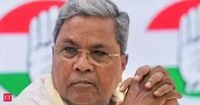In Karnataka, a controversial incident has ignited protests among the Brahmin community after students were reportedly forced to remove their sacred threads, known as 'janivara', before entering the Common Entrance Test (CET) halls. This situation has raised questions about the intersection of religious practices and examination protocols, leading to widespread outrage and demands for accountability.
Reports indicate that the incidents occurred in multiple districts, including Shivamogga, Bidar, and Dharwad, where students faced the unexpected requirement to remove their sacred threads, which are integral to their religious identity. The Chief Minister of Karnataka, Siddaramaiah, has publicly condemned these actions, labeling them as unlawful. "No one should impose rules that interfere with one’s religious faith and must limit such rules to only prevent any malpractice in the exam. Not beyond that," he stated during a media briefing.
Siddaramaiah's comments came shortly after Deputy Chief Minister DK Shivakumar also condemned the actions taken against the students. On April 21, 2025, Shivakumar, speaking in the presence of the seer of Sringeri Mutt, emphasized the need for immediate action against those responsible for enforcing the controversial rule. The Deputy Chief Minister’s remarks underscored the government’s commitment to addressing the concerns of the affected community.
The Karnataka Pradesh Congress Committee (KPCC) general secretary, Dr. Sankara Guha Dwarakanath, expressed his dismay over the situation, urging the government to be sensitive to the beliefs and practices of Brahmins. He stressed the importance of taking timely action to support the community, noting that the Congress party had previously demonstrated more vigorous protest against perceived injustices affecting Muslim girls during the Hijab controversy under the previous BJP administration.
At the heart of the issue is a rule established to prevent examination malpractice, which prohibits students from wearing metal objects, including ornaments, during the CET. However, the rule was misinterpreted by some officials and guards, leading to the unjust removal of sacred threads, which are made of cotton and not metal. This misinterpretation has sparked significant backlash from the Brahmin community, who view the sacred thread as a vital element of their religious and cultural identity.
In response to the events, the Akhila Karnataka Brahmana Mahasabha has organized a procession in Mangaluru on April 22, 2025, to voice their condemnation of the incidents. The procession is set to begin at Sharavu Mahaganapathi Temple and will proceed to Mini Vidhana Soudha at 4 p.m. Following the procession, a protest will be staged near the Mini Vidhana Soudha, according to Sridhara Holla, the convener of the Dakshina Kannada unit of the Mahasabha.
The procession is expected to draw significant participation from the Brahmin community, who are eager to express their grievances and demand accountability from the authorities. The events have not only highlighted the tension between religious practices and educational regulations but also underscored the need for greater sensitivity and understanding within the government when it comes to cultural and religious issues.
As the situation continues to unfold, the Chief Minister has promised disciplinary action against the officials involved in the incidents. Siddaramaiah reiterated, “We will not tolerate such acts. We will take disciplinary action against the officials concerned,” signaling a commitment to uphold the rights of students and respect their religious beliefs.
The incidents surrounding the CET and the sacred threads have sparked discussions about the broader implications of such rules on religious practices in educational settings. Many community leaders and advocates are calling for a review of the regulations to ensure that they do not infringe upon the religious freedoms of students.
The controversy is reminiscent of previous debates in India regarding the balance between secular regulations and religious practices, raising questions about how educational institutions can accommodate diverse beliefs while maintaining integrity in their examination processes.
As the protests unfold and the government responds, it remains to be seen how this incident will influence future policies regarding religious expression in academic settings. The Brahmin community’s mobilization reflects a growing awareness and assertiveness regarding their rights, and their actions may pave the way for more inclusive practices in the future.
In conclusion, the ongoing situation in Karnataka serves as a crucial reminder of the delicate balance between maintaining examination integrity and respecting the religious beliefs of students. As the protests gain momentum, the response from the government will be closely watched by both supporters and critics alike.





